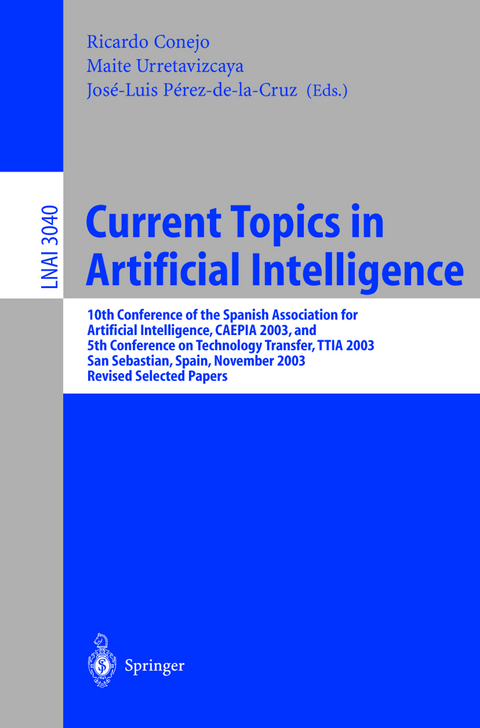
Current Topics in Artificial Intelligence
Springer Berlin (Verlag)
978-3-540-22218-7 (ISBN)
Invited Talk.- Reasoning about Teaching and Learning.- Selected Papers from the 10th Conference of the Spanish Association for Artificial Intelligence (CAEPIA03).- A Document-Oriented Approach to the Development of Knowledge Based Systems.- A Flexible Approach to the Multidimensional Model: The Fuzzy Datacube.- A Framework for Ontology Reuse and Persistence Integrating UML and Sesame.- A Method to Adaptively Propagate the Set of Samples Used by Particle Filters.- A Model for Fuzzy Temporal Reasoning on a Database.- A Multimodal Logic Approach to Order of Magnitude Qualitative Reasoning.- A New Genetic Approach for the Partitioning Problem in Distributed Virtual Environment Systems.- A Proposal of Diagnosis for an ITS for Computational Logic.- A Reasoning Model for CBR_BDI Agents Using an Adaptable Fuzzy Inference System.- A Recurrent Neural Network for Airport Scales Location.- Adaptive P2P Multimedia Communication Using Hybrid Learning.- An Approach for Ontology Building from Text Supported by NLP Techniques.- An Efficient Preprocessing Transformation for Functional Dependencies Sets Based on the Substitution Paradigm.- An Evolutionary Algorithm for Solving Word Equation Systems.- Analysis of the Functional Block and Operator Involved in Fuzzy System Design.- Analysis of the Topology Preservation of Accelerated Growing Neural Gas in the Representation of Bidimensional Objects.- Application of Crossover Operators Based on Confidence Interval in Modeling Problems Using Real-Coding Genetic Algorithms.- ASPerson: Agent System for Personalizing Web Contents over Wireless Connection.- Automatic Computation of the Fundamental Matrix from Matched Lines.- BOGAR_LN: An Agent Based Component Framework for Developing Multi-modal Services Using Natural Language.- Building SoftwareAgents from Software Components.- Clustering Main Concepts from e-Mails.- Definition of Postural Schemes for Humanoid Robots.- Designing a Semantic Portal for Collaborative Learning Communities.- Dialogue Act Classification in a Spoken Dialogue System.- Distributed Non-binary Constraints.- Dynamic User Modeling in a System for Personalization of Web Contents.- Embracing Causality in Inducing the Effects of Actions.- Employing TSK Fuzzy Models to Automate the Revision Stage of a CBR System.- Enhancing Consistency Based Diagnosis with Machine Learning Techniques.- Exploiting Disambiguated Thesauri for Information Retrieval in Metadata Catalogs.- Face Detection with Active Contours Using Color Information.- Formal Verification of Molecular Computational Models in ACL2: A Case Study.- Fuzzy Logic Based Torque Ripple Minimization in Switched Reluctance Motors.- Generating Random Orthogonal Polygons.- Genetic Programming for Automatic Generation of Image Processing Algorithms on the CNN Neuroprocessing Architecture.- Heuristic Based Sampling in Estimation of Distribution Algorithms: An Initial Approach.- Heuristic Rules and Genetic Algorithms for Open Shop Scheduling Problem.- Hybrid Approach Based on Temporal Representation and Classification Techniques Used to Determine Unstable Conditions in a Blast Furnace.- Kernel Functions over Orders of Magnitude Spaces by Means of Usual Kernels. Application to Measure Financial Credit Risk.- Negotiation Support in Highly-Constrained Trading Scenarios.- Normalized Cyclic Edit Distances: An Efficient Algorithm.- On the Heuristic Performance of Perimeter Search Algorithms.- Plug&Play Object Oriented Bayesian Networks.- Real-Time Extensions in Multi-agent Communication.- Representing Canonical Models as Probability Trees.- Robust Aggregation of Expert Opinions Based on Conflict Analysis and Resolution.- Rotation-Based Ensembles.- SACEME: An Authoring Tool for Knowledge Acquisition Using Techniques of Programming by Examples.- Scatter Search for the Feature Selection Problem.- Social Analysis of Multi-agent Systems with Activity Theory.- SoftComputing Techniques Applied to Catalytic Reactions.- Sports Image Classification through Bayesian Classifier.- Text Mining Using the Hierarchical Syntactical Structure of Documents.- The Synergy of GA and Fuzzy Systems for Multidimensional Problem: Application to Time Series Prediction.- Time-Series Prediction: Application to the Short-Term Electric Energy Demand.- Towards a Clinical Practice Guideline Implementation for Asthma Treatment.- Towards a Generic Multiagent Model for Decision Support: Two Case Studies.- Towards Biresiduated Multi-adjoint Logic Programming.- Using the Geometrical Distribution of Prototypes for Training Set Condensing.- X-Learn: An Intelligent Educational System Oriented towards the Net.- Selected Papers from the 5th Sessions on Technology Transfer of Artificial Intelligence (TTIA03).- A Neuro-fuzzy Decision Model for Prognosis of Breast Cancer Relapse.- An Interactive Train Scheduling Tool for Solving and Plotting Running Maps.- Application of Evolutionary Computation Techniques to the Optimal Short-Term Scheduling of the Electrical Energy Production.- Integration of a Generic Diagnostic Tool in Virtual Environments for Procedural Training.- TAPLI: An Adaptive Web-Based Learning Environment for Linear Programming.
| Erscheint lt. Verlag | 17.6.2004 |
|---|---|
| Reihe/Serie | Lecture Notes in Artificial Intelligence | Lecture Notes in Computer Science |
| Zusatzinfo | XIV, 689 p. |
| Verlagsort | Berlin |
| Sprache | englisch |
| Maße | 155 x 235 mm |
| Gewicht | 1000 g |
| Themenwelt | Informatik ► Software Entwicklung ► User Interfaces (HCI) |
| Informatik ► Theorie / Studium ► Künstliche Intelligenz / Robotik | |
| Schlagworte | Algorithmic Learning • Artificial Intelligence • bayesia • Bayesian networks • Computational Intelligence • Computational Logic • evolutionary computation • Evolutionary Computing • Formal Verification • Genetic algorithms • Hardcover, Softcover / Informatik, EDV/Informatik • HC/Informatik, EDV/Informatik • Heuristics • Intelligent Agents • Intelligent Tutoring Systems • Knowledge • knowledge base • knowledge management • Künstliche Intelligenz • learning • Logic Programming • machine learning • Multi-agent Systems • natural language • Natural Language Processing • neural computing • Ontologies • Robotics • Soft Computing |
| ISBN-10 | 3-540-22218-9 / 3540222189 |
| ISBN-13 | 978-3-540-22218-7 / 9783540222187 |
| Zustand | Neuware |
| Haben Sie eine Frage zum Produkt? |
aus dem Bereich


